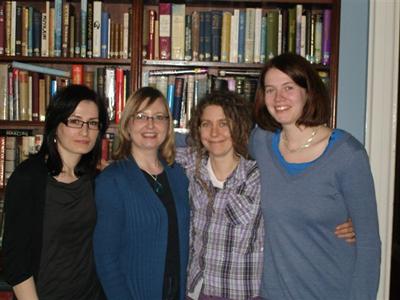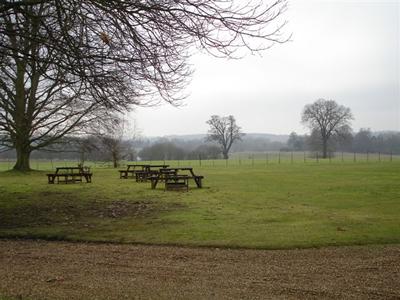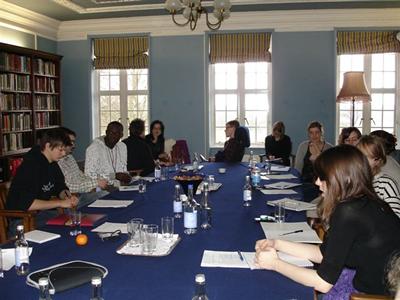Annual Postgraduate conference at Cumberland Lodge 2010
Every year, PAIR holds a postgraduate conference at Cumberland Lodge in Windsor Great Park, a beautiful retreat located in stunning countryside and an excellent setting for academic debate and discussion.
For staff and students alike, it is a highlight of our year, and a terrific opportunity to spend time with colleagues in relaxed surroundings and to hear about the remarkable range of academic research being conducting in our department. The Lodge, built in the 17th century, provides for the exchange of views and arguments through conferences, seminars and lectures, and especially welcomes university groups geared towards enabling staff and students to spend time together talking and learning from each other. Our 2010 Conference was attended by around 20 students completing both PhD and MSc degrees, as well as a couple of keen undergraduates who hope to pursue postgraduate study with us. Our conference took place in the beautiful Library at the Lodge, and was a supportive, intimate and relaxed environment for the staff and students who delivered papers.
Dr Clare Saunders, Lecturer and RCUK Fellow, delivered the Friday evening paper entitled Unblocking confusion over blockmodels in social movement studies. Social movement scholars often use the blockmodelling technique to help answer questions about the nature of movement networks, and Clare’s paper sought to locate some of the problems with this approach, the problematic results it can occasionally produce, and how these issues might be overcome with alternative approaches, by using a case study of interorganisational networking in Friends of the Earth International.
Matthew Ryan, who began his PhD with us in autumn 2009, got our Saturday Student presentation morning session started with another methodogical paper, How fuzzy is democracy? Exploring the application of qualitative analysis techniques to explain successes and failures in democratic innovation. The paper offered an insightful analysis into some of the tricky methods issues involved in drawing conclusions about ‘successes’ and ‘failures’ when it comes to democratic innovation, and focused on the application of ‘fuzzy-set’ qualitative analysis to the study of such innovations. It concluded with some observations about how this method can help us to understand the conditions required for the institutionalisation of citizen power through participatory budgeting programmes.
Following coffee, Dr Alice Moseley, a research fellow in PAIR, presented a paper entitled Why do street-level bureaucrats adopt coordination mechanisms? Exploring motivations for joined-up government from the bottom up, which drew on on-going research into homelessness policy in order to understand how governance happens in this area and what this might tell us about the extent to which joined’up governance really does take place.
We held a roundtable discussion on Saturday evening: Politics Post-Expenses – ‘Rebuidling’ Trust, ‘Recreating’ Engagement, and the Future of the British Political System. This highly successful session explored recent rhetoric in British politics about the need to rebuild public trust following the devasting MPs expenses crisis of spring 2009, and about how particular institutional changes or innovations might foster greater participation in the future. The topic prompted comment and analyses from everyone present, and discussions continued afterwards as we relaxed in the bar.
Matthew Medici, another first year PhD student, delivered his paper on Sunday morning, entitled Anarchy ≠ Anomie. The paper sought to highlight the fact that by placing material factors at the core of their thought, realists such as Morgenthau have relegated ideational power, and therefore norms, to the periphery. He argued that this was not unproblematic, and discussed the mutually constitutive nature of ideational and material power, suggesting that whilst material factors are important, realism fails to provide the realm of ideas with its just import.
Our final paper was from Dr Bona Muzaka, on the subject of Reframing Intellectual Property Rights as a Development Issue. It focused on the current reform agenda at the World Intellectual Property Organisation, led by certain developing countries and civil society groups, with the aim of reforming the intellectual property regime so that it better serves developmental ends. The paper supplied some historical perspective, by drawing out similarities with previous efforts on the part of developing countries during the 1970s, which eventually failed. In this context, the paper sought to offer a new understanding of development as a public good, and locate the role of intellectual property rights within it.



It was wonderful to hear such fantastic papers delivered from PhD students at such an early stage in their careers, and also to listen to such engaged discussion and argument from all the students who attended. We are lucky to have this terrific group of people pursuing degrees with us, and we really look forward to them continuing to play a key role in our department.